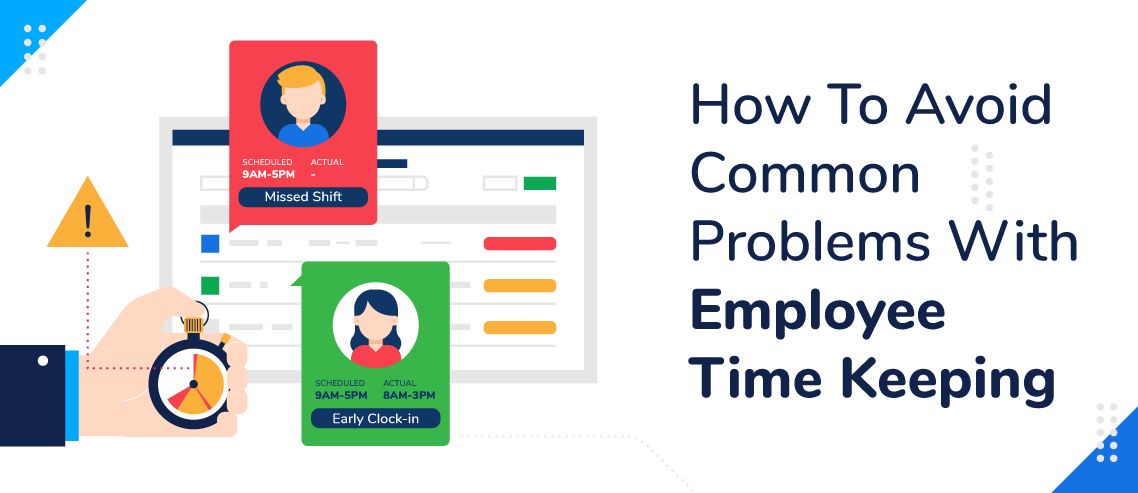10 Strategies to Stop Buddy Punching

Employees across the US are stealing 4.5 hours per week, which means they are sneaking a six-week paid vacation and you don’t even know.
Sometimes, this time theft is intentional and other times it’s simply because of mismanagement. In either case, it is costing your business.
So, in this post, we’ll show you how to eliminate this loss of money and time. We’ll share 10 effective strategies that discourage and minimize buddy punching.
What Is Buddy Punching?
Buddy punching is when an employee clocks in or out for another employee.
For example, worker A could clock in for worker B at 8:00 a.m. — even if they arrive at 8:20 a.m. Similarly, worker A could clock out for worker B at 4:00 p.m. — even if they’ve left at 3:00 p.m.
As you can notice, inaccurate timestamps are being clocked in and out here, which means you would be paying employees for hours they did not work.
Now, of course, not every employee does this with the intention of bagging extra money. Sometimes, they’re not careful enough. At other times, they don’t see a big time difference and don’t want to get fired for clocking in late every day.
For business owners, however, this means significant losses over the long run. For example,
if you’re paying $50/hour, you’ll lose $150 to $250 per month per employee for just 3-5 hours of time theft. Ten employees would mean $1500 – $2500.
10 Strategies to Stop Buddy Punching
Now that you understand what buddy punching is and how much it can cost your business, here are ten tested ways to stop it.
1) Explain to Employees That Buddy-Punching Is Morally Wrong
As highlighted earlier, buddy punching is often unintentional. Many employees are unaware of the compound effect of their actions and don’t realize it’s a morally wrong practice.
So as a first step, educate your employees about buddy punching and make them understand that it’s a type of theft. You can share examples and case studies where buddy punching has led to unfairness and loss of trust within the workplace.
We also recommend encouraging open dialogue to ensure that employees comprehend the broader impact of their actions beyond company policies. This will foster a culture of honesty and accountability.
2) Use Attendance Software With Biometric Capabilities
Biometric attendance systems are advanced time-tracking solutions that use the unique physical traits of individuals to verify their identity when recording their work hours. These systems rely on biometric data like:
- Fingerprint
- Facial recognition
- Iris or retina scanning
- Hand geometry
- Voice recognition
These metrics are difficult to forge or impersonate, meaning your employees cannot clock in or out for anyone else.
3) Foster a Culture of Honesty
Another way to stop buddy punching is to foster an overall culture of honesty in your company. It’s important to lead by example here. You can also model open communication by actively listening, being receptive to feedback, and being transparent in your own communication. When employees see leadership embracing open communication, they are more likely to do the same.
You can also reinforce the importance of honesty by regularly reminding employees of your company’s values and policies. Also, consider arranging an anonymous hotline or suggestion box. It will allow employees to register their complaints without fear.
4) Regularly Review Employee Time and Attendance Records
Analyze employee attendance each week and look for any irregularities. If you see any suspicious records, discuss this with the concerned employee. It will not only reduce the instances of buddy punching but it will also remind employees that timekeeping accuracy is a priority for your company.
5) Create a Well-Defined Attendance and Time Policy
A well-defined time and attendance policy defines expected conduct and clarifies the consequences of misconduct. It makes it clear that the company won’t tolerate dishonesty.
Your policy should:
- Outline expectations for punctuality (like start and end times, breaks, and overtime rules)
- State how time will be recorded
- Address attendance-related matters (like requesting time off, reporting absences, consequences for absenteeism)
- Ensure legal compliance by incorporating labor laws (such as minimum wage and overtime regulations)
Also, regularly review and update the policy to adapt to changing needs and legal requirements.
6) Link the Time Clock to the IP Addresses of Employee Computers
Another highly effective strategy to counter buddy punching is to link time clocks to the IP addresses of employee computers. This means employees can only clock in or out when they are physically on the company premises.
7) Employ On-Site Supervisors
For large teams, consider employing on-site supervisors to oversee attendance. These supervisors act as a visible deterrent against buddy-punching. You can also ask managers to take on this role on a rotational basis.
8) Educate Employees on the Consequences of Buddy-Punching
Conduct training sessions or interactive workshops where you educate employees about the consequences of buddy-punching at your company. Let them know about the disciplinary actions you could take and that it could even lead to job termination.
9) Conduct Random Spot Checks
Conducting surprise checks can create uncertainty among employees, stopping potential buddy-punchers. The element of surprise keeps employees alert and discourages dishonest timekeeping.
10) Implement Dual Authorization for Changes in Attendance Records
Dual authorization can help maintain transparency and accountability in attendance record modifications. It involves requiring approval from both the employee and a manager or supervisor before any changes to attendance records are accepted.
This added layer of oversight ensures that only authorized modifications are made. This, in turn, reduces the chances of data manipulation.
What Are the Consequences of Buddy Punching for Your Business?
Buddy punching is clearly bad for your business. Here are six important consequences:
- Inflates labor costs as you pay for hours employees didn’t work
- Disrupts workplace productivity
- Loss of trust between employees and leadership
- Increases workload on responsible employees
- Promotes dishonesty, which could lead to other unethical behaviors
- Reduces operational efficiency of the company
Note that all of these consequences ultimately lead to monetary loss.
How to Deal With Employees Caught Buddy Punching?
If you catch any of your employees buddy punching, it’s best to initiate a private discussion and inquire about the reason behind their practices. This will give you an idea about the root cause of the problem, so you can fix it. But at the same time, issue them a warning so they know it is unacceptable.
Final Words
Buddy punching is when employees clock in or out for their colleagues. This not only establishes a culture of dishonesty in your company but also leads to productivity and profit losses.
Fortunately, there is a wide range of strategies that you can use to stop this practice. We have discussed the ten most effective ones above and hope you now have some idea about how to stop buddy punching at your business.
JD enjoys teaching people how to use ZoomShift to save time spent on scheduling. He’s curious, likes learning new things everyday and playing the guitar (although it’s a work in progress).


